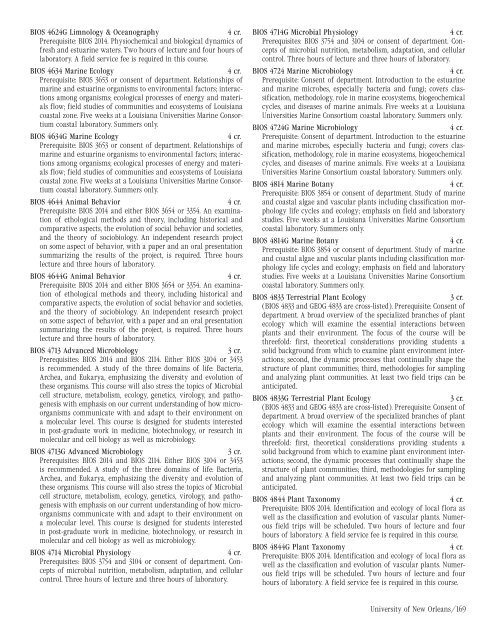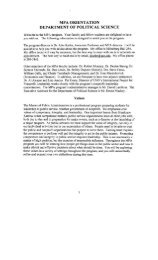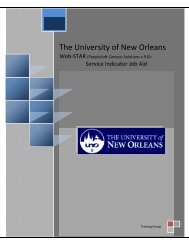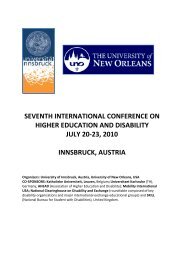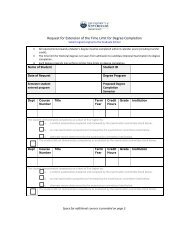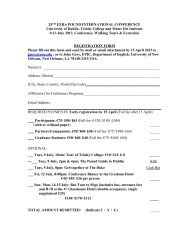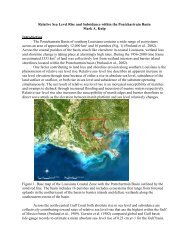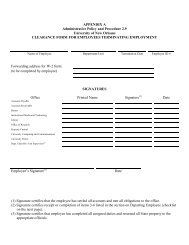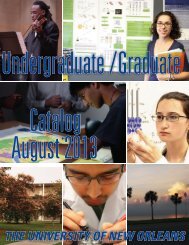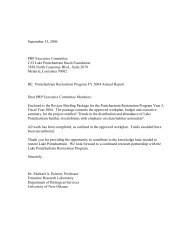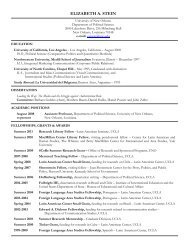Untitled - University of New Orleans
Untitled - University of New Orleans
Untitled - University of New Orleans
Create successful ePaper yourself
Turn your PDF publications into a flip-book with our unique Google optimized e-Paper software.
BIOS 4624G Limnology & Oceanography<br />
4 cr.<br />
Prerequisite: BIOS 2014. Physiochemical and biological dynamics <strong>of</strong><br />
fresh and estuarine waters. Two hours <strong>of</strong> lecture and four hours <strong>of</strong><br />
laboratory. A field service fee is required in this course.<br />
BIOS 4634 Marine Ecology<br />
4 cr.<br />
Prerequisite: BIOS 3653 or consent <strong>of</strong> department. Relationships <strong>of</strong><br />
marine and estuarine organisms to environmental factors; interactions<br />
among organisms; ecological processes <strong>of</strong> energy and materials<br />
flow; field studies <strong>of</strong> communities and ecosystems <strong>of</strong> Louisiana<br />
coastal zone. Five weeks at a Louisiana Universities Marine Consortium<br />
coastal laboratory. Summers only.<br />
BIOS 4634G Marine Ecology<br />
4 cr.<br />
Prerequisite: BIOS 3653 or consent <strong>of</strong> department. Relationships <strong>of</strong><br />
marine and estuarine organisms to environmental factors; interactions<br />
among organisms; ecological processes <strong>of</strong> energy and materials<br />
flow; field studies <strong>of</strong> communities and ecosystems <strong>of</strong> Louisiana<br />
coastal zone. Five weeks at a Louisiana Universities Marine Consortium<br />
coastal laboratory. Summers only.<br />
BIOS 4644 Animal Behavior<br />
4 cr.<br />
Prerequisite: BIOS 2014 and either BIOS 3654 or 3354. An examination<br />
<strong>of</strong> ethological methods and theory, including historical and<br />
comparative aspects, the evolution <strong>of</strong> social behavior and societies,<br />
and the theory <strong>of</strong> sociobiology. An independent research project<br />
on some aspect <strong>of</strong> behavior, with a paper and an oral presentation<br />
summarizing the results <strong>of</strong> the project, is required. Three hours<br />
lecture and three hours <strong>of</strong> laboratory.<br />
BIOS 4644G Animal Behavior<br />
4 cr.<br />
Prerequisite: BIOS 2014 and either BIOS 3654 or 3354. An examination<br />
<strong>of</strong> ethological methods and theory, including historical and<br />
comparative aspects, the evolution <strong>of</strong> social behavior and societies,<br />
and the theory <strong>of</strong> sociobiology. An independent research project<br />
on some aspect <strong>of</strong> behavior, with a paper and an oral presentation<br />
summarizing the results <strong>of</strong> the project, is required. Three hours<br />
lecture and three hours <strong>of</strong> laboratory.<br />
BIOS 4713 Advanced Microbiology<br />
3 cr.<br />
Prerequisites: BIOS 2014 and BIOS 2114. Either BIOS 3104 or 3453<br />
is recommended. A study <strong>of</strong> the three domains <strong>of</strong> life: Bacteria,<br />
Archea, and Eukarya, emphasizing the diversity and evolution <strong>of</strong><br />
these organisms. This course will also stress the topics <strong>of</strong> Microbial<br />
cell structure, metabolism, ecology, genetics, virology, and pathogenesis<br />
with emphasis on our current understanding <strong>of</strong> how microorganisms<br />
communicate with and adapt to their environment on<br />
a molecular level. This course is designed for students interested<br />
in post-graduate work in medicine, biotechnology, or research in<br />
molecular and cell biology as well as microbiology.<br />
BIOS 4713G Advanced Microbiology<br />
3 cr.<br />
Prerequisites: BIOS 2014 and BIOS 2114. Either BIOS 3104 or 3453<br />
is recommended. A study <strong>of</strong> the three domains <strong>of</strong> life: Bacteria,<br />
Archea, and Eukarya, emphasizing the diversity and evolution <strong>of</strong><br />
these organisms. This course will also stress the topics <strong>of</strong> Microbial<br />
cell structure, metabolism, ecology, genetics, virology, and pathogenesis<br />
with emphasis on our current understanding <strong>of</strong> how microorganisms<br />
communicate with and adapt to their environment on<br />
a molecular level. This course is designed for students interested<br />
in post-graduate work in medicine, biotechnology, or research in<br />
molecular and cell biology as well as microbiology.<br />
BIOS 4714 Microbial Physiology<br />
4 cr.<br />
Prerequisites: BIOS 3754 and 3104 or consent <strong>of</strong> department. Concepts<br />
<strong>of</strong> microbial nutrition, metabolism, adaptation, and cellular<br />
control. Three hours <strong>of</strong> lecture and three hours <strong>of</strong> laboratory.<br />
BIOS 4714G Microbial Physiology<br />
4 cr.<br />
Prerequisites: BIOS 3754 and 3104 or consent <strong>of</strong> department. Concepts<br />
<strong>of</strong> microbial nutrition, metabolism, adaptation, and cellular<br />
control. Three hours <strong>of</strong> lecture and three hours <strong>of</strong> laboratory.<br />
BIOS 4724 Marine Microbiology<br />
4 cr.<br />
Prerequisite: Consent <strong>of</strong> department. Introduction to the estuarine<br />
and marine microbes, especially bacteria and fungi; covers classification,<br />
methodology, role in marine ecosystems, biogeochemical<br />
cycles, and diseases <strong>of</strong> marine animals. Five weeks at a Louisiana<br />
Universities Marine Consortium coastal laboratory. Summers only.<br />
BIOS 4724G Marine Microbiology<br />
4 cr.<br />
Prerequisite: Consent <strong>of</strong> department. Introduction to the estuarine<br />
and marine microbes, especially bacteria and fungi; covers classification,<br />
methodology, role in marine ecosystems, biogeochemical<br />
cycles, and diseases <strong>of</strong> marine animals. Five weeks at a Louisiana<br />
Universities Marine Consortium coastal laboratory. Summers only.<br />
BIOS 4814 Marine Botany<br />
4 cr.<br />
Prerequisite: BIOS 3854 or consent <strong>of</strong> department. Study <strong>of</strong> marine<br />
and coastal algae and vascular plants including classification morphology<br />
life cycles and ecology; emphasis on field and laboratory<br />
studies. Five weeks at a Louisiana Universities Marine Consortium<br />
coastal laboratory. Summers only.<br />
BIOS 4814G Marine Botany<br />
4 cr.<br />
Prerequisite: BIOS 3854 or consent <strong>of</strong> department. Study <strong>of</strong> marine<br />
and coastal algae and vascular plants including classification morphology<br />
life cycles and ecology; emphasis on field and laboratory<br />
studies. Five weeks at a Louisiana Universities Marine Consortium<br />
coastal laboratory. Summers only.<br />
BIOS 4833 Terrestrial Plant Ecology<br />
3 cr.<br />
(BIOS 4833 and GEOG 4833 are cross-listed). Prerequisite: Consent <strong>of</strong><br />
department. A broad overview <strong>of</strong> the specialized branches <strong>of</strong> plant<br />
ecology which will examine the essential interactions between<br />
plants and their environment. The focus <strong>of</strong> the course will be<br />
threefold: first, theoretical considerations providing students a<br />
solid background from which to examine plant environment interactions;<br />
second, the dynamic processes that continually shape the<br />
structure <strong>of</strong> plant communities; third, methodologies for sampling<br />
and analyzing plant communities. At least two field trips can be<br />
anticipated.<br />
BIOS 4833G Terrestrial Plant Ecology<br />
3 cr.<br />
(BIOS 4833 and GEOG 4833 are cross-listed). Prerequisite: Consent <strong>of</strong><br />
department. A broad overview <strong>of</strong> the specialized branches <strong>of</strong> plant<br />
ecology which will examine the essential interactions between<br />
plants and their environment. The focus <strong>of</strong> the course will be<br />
threefold: first, theoretical considerations providing students a<br />
solid background from which to examine plant environment interactions;<br />
second, the dynamic processes that continually shape the<br />
structure <strong>of</strong> plant communities; third, methodologies for sampling<br />
and analyzing plant communities. At least two field trips can be<br />
anticipated.<br />
BIOS 4844 Plant Taxonomy<br />
4 cr.<br />
Prerequisite: BIOS 2014. Identification and ecology <strong>of</strong> local flora as<br />
well as the classification and evolution <strong>of</strong> vascular plants. Numerous<br />
field trips will be scheduled. Two hours <strong>of</strong> lecture and four<br />
hours <strong>of</strong> laboratory. A field service fee is required in this course.<br />
BIOS 4844G Plant Taxonomy<br />
4 cr.<br />
Prerequisite: BIOS 2014. Identification and ecology <strong>of</strong> local flora as<br />
well as the classification and evolution <strong>of</strong> vascular plants. Numerous<br />
field trips will be scheduled. Two hours <strong>of</strong> lecture and four<br />
hours <strong>of</strong> laboratory. A field service fee is required in this course.<br />
<strong>University</strong> <strong>of</strong> <strong>New</strong> <strong>Orleans</strong>/169


